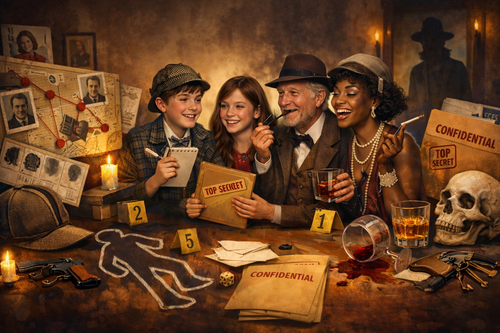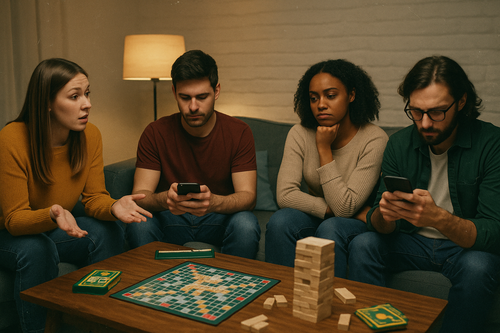
Murder, Mayhem & DIY Madness: How to build your own
Share
Let’s get this out of the way: no one plays a murder mystery game just to win. You play it for the drama, the secrets, the fake accents, and the glorious chaos that unfolds when someone dramatically accuses their best friend of murder over a cheese plate. Whether it’s a boxed board game, a full-blown roleplaying event, or a free-for-all you cooked up with a printer and too much ambition, murder mystery games are where storytelling, puzzling, and performance collide.
But if you’ve ever tried to Google “best murder mystery game” or “how to make your own,” you’ve probably fallen into a pit of confusing options, oddly specific Victorian themes, and people arguing about whether or not you need a costume. (Spoiler: you don’t. But should you? Always.)
So let’s break it all down: What is the best murder mystery game? How do you build one that feels like an RPG instead of a clunky script? And yes, can you do all this without spending a cent? Let’s solve the case.
What Is the Best Murder Mystery Game?
Short answer: the one your group actually enjoys playing.
Longer (and more helpful) answer: the best murder mystery game depends on your vibe. Are you more into structured storytelling or chaotic improv? Puzzles or performances? Something you can finish in 90 minutes, or a full-night event with costume changes?
Here are a few standouts, by category:
-
Best for Drama & Costumes: Murder Mystery Party boxed sets or anything from My Mystery Party. Great for themed nights (Roaring Twenties, Masquerade Ball, etc.). You get character guides, secret objectives, and it often ends in a big reveal scene.
-
Best for Puzzle-Lovers: Hunt A Killer or Death at the Dive Bar (from the same creators). These mix deduction, physical evidence, and storytelling in a way that feels a bit more like solving a case file than putting on a show.
-
Best for Social Chaos: Blood on the Clocktower or Werewolf with a murder mystery twist. Great for large groups who love deception, accusation, and not taking things too seriously.
-
Best Hybrid: This is where games like Min(d)gle shine—mixing narrative, light roleplay, and interactive puzzles. You get a little structure, a little freedom, and a lot of chances for your friends to surprise you.
Bottom line: Don’t pick the “best” game. Pick the best one for your group. If your crew hates acting, don’t force them into Shakespeare mode. If they love being dramatic, give them a spotlight.
How to Make a Murder Mystery RPG (That Doesn't Fall Apart)
Making your own murder mystery game sounds like a big lift. And it can be. But it’s also wildly satisfying, especially if you want something tailored to your group or a specific setting (campus, office, inside joke-filled friend group).
Here’s a blueprint:
1. Set the Scene
Pick a theme and setting: haunted mansion, summer camp, spaceship, office holiday party gone wrong. Make it fun. You need a reason why all the characters are together and why someone ends up dead. (Spoiler: it’s never natural causes.)
2. Create the Characters
Give everyone a role. They should each have:
-
A short backstory
-
A relationship to the victim
-
A secret
-
A goal (find the killer, protect their secret, steal something else...)
Bonus points if their goals conflict.
3. Plan the Murder & Clues
Decide who the murderer is before you start writing everything else. That helps keep your clues consistent. Then, sprinkle in evidence, contradictions, red herrings, and moments of revelation.
4. Let It Unfold, RPG Style
Rather than a script, think of it like a live-action RPG. Give players just enough direction to get started, then let them act and react. Want to level it up? Add in mechanics like:
-
Secret item cards
-
Limited actions per round
-
Special powers (e.g., one-time clue reveal)
This gives it more structure and makes it feel like a game, not just a chaotic dinner.
5. Test It. Rewrite It. Bribe Your Friends to Try It Again.
What Is the Murder Mystery Board Game Called?
If you're looking for something physical and store-bought, there are plenty of board game-style murder mysteries. A few of the most well-known:
-
Clue (aka Cluedo): The OG. Simple, classic, replayable. Not much roleplay, but a good entry point.
-
Mysterium: Cooperative, spooky, and visually gorgeous. Less about deduction, more about interpreting clues from a ghost.
-
Chronicles of Crime: Uses an app and QR codes. Blends traditional gameplay with digital interaction. Super fun if you like techy twists.
-
Deception: Murder in Hong Kong: Combines hidden roles with deduction. Great for competitive types who love bluffing.
These are board games with murder mystery mechanics. They're a great choice if your group loves game nights but isn’t into acting things out.
Is There a Free Murder Mystery Game for Large Groups?
Yes! Plenty. Especially if you’re willing to get a little DIY with it.
Here are a few ways to find or create free murder mystery games:
-
Online Printables: Some websites offer free downloadable kits. They often come with character sheets, clue cards, and instructions. Good for classrooms or big groups. We have a free case file for you to try.
-
Google Drive Games: Search for "free murder mystery game Google Docs" and you’ll find community-created games you can copy, tweak, and run.
-
Virtual Mystery Kits: Some platforms released free versions during the pandemic. These can be played over Zoom or in person.
-
Build Your Own: Honestly, for a large group, custom is sometimes easier. Just create character cards, a murder timeline, and a few props or visuals. Keep it simple, and focus on giving people roles and motivation.
Pro tip: When running a free or DIY mystery for a big group, assign roles in advance and encourage people to read up beforehand. It cuts down on chaos and makes for smoother gameplay.
Final Thoughts (a.k.a. The Big Reveal)
There’s no one way to run a murder mystery. Some people want puzzles. Some people want drama. Some people just want to accuse their friends of murder and do a fake faint onto the couch. And that’s the beauty of it.
Whether you’re buying a boxed game, creating your own RPG from scratch, or cobbling together something from a Google Doc and pure enthusiasm, what matters is that everyone’s invested and having fun.
And if you want a little help balancing story, clues, and player experience, there are folks (hi!) who do this professionally. Min(d)gle games, for example, aim to land right in that magical middle ground—enough story to stay interesting, enough structure to avoid confusion, and enough chaos to keep it fun.
Just don’t forget the snacks. Someone always gets hungry right before the big twist.



